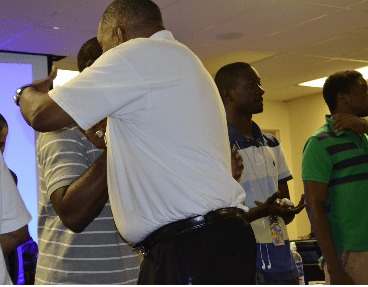While the older men listened, the young men told their stories. Several of the young men remembered fathers who were, at best, fleeting presences in their lives. When the stories were done, the older men shook the young men’s hands and symbolically apologized for their generation’s shortcomings.
The generations of men were brought together for a recent workshop, sponsored by the D.C. Housing Authority (DCHA). The event was part of a much larger effort, a federal Fatherhood and Mentoring Initiative, started by President Barack Obama whose own father was largely absent from his life. Obama sees being a father to his two daughters as his most important job.
Housing authorities across the country have been invited to join the initiative, to take a closer look at the workings of families in public housing and the lack of male role models in low income communities.
The fathers themselves are not the only ones to blame for the deterioration of fatherhood, said Dena Michaelson, the DCHA public affairs director. Government and charity programs aimed at helping single mothers sometimes also inadvertently create barriers for fathers. For instance welfare programs are based on income, which means a family with both parents and two incomes would be less likely to qualify for welfare than a single parent.
Motherhood can also be a potential barrier to fatherhood. If the mother and father do not have a good relationship, the father may be pushed away from his children.
Lamont Carey, a workshop leader, said from his experience, “In order for me to be a good father, I had to have a good relationship with the mother.”
The District’s fatherhood initiative event, held in late June included three simultaneous workshops: one for the mothers, one for the fathers and one for the children. Iris Mclaurin-Southall, the DCHA coordinator for the event, said that all three of these parts of the families have to work together in order to solve the issues at hand.
The young men who offered their stories in one of the workshops came from Covenant House, a multi-functional home for at-risk youths. They discussed the problems they faced in growing up without strong male influences in a group led by motivational speaker Janks Morton. Some of the young men had fathers in their lives, but only a few had their fathers for their entire lives. Some of them said that not having a consistent male presence helped them grow up to be more independent and taught them how to teach themselves. However, the general feeling was that life was more difficult without a male role model.
At the beginning of the session, one of the young men said his father was there for him. But after listening to the others talk about their struggles, he realized that because of his father’s fleeting presence he faced the same problems, such as lack of guidance on how to be a man and trying to learn from someone’s mistakes instead of from his examples.
While known as the Fatherhood and Mentoring Initiative, the effort is also aimed at mothers, who play an important role in increasing fathers accountability. According to Michaelson the initiative’s intentions are geared toward making both parents “an integral part of their children’s lives.”
David Cauthen saw first-hand that being a part of his son’s life was important. He has enjoyed a renewed relationship with his 11-year-old son for the past four years.
“I can see the struggles that he has now because I wasn’t there earlier,” Cauthen said.
As he reconnected with his son, Cauthen started working with an organization called 100 Fathers Inc. He said the group has helped him define his role as a father and find helpful information on fatherhood. Cauthen said he did not have a father in his life while he was growing up, so he found it difficult to know how to be an effective dad.
“How can you know how to be a good dad if you never had one?” he asked.
Cauthen wanted to break the cycle so that his son would know more about fatherhood than he did.
Kwaco Atiba is also involved in the 100 Fathers Inc. He was 13 years old when his first son was born, so he was not focused on the responsibilities of being a father at the time. Unlike Cauthen, Atiba was not able to reconnect with his family until later in life. For the past six years, he has been in contact with his youngest son, who is 30 years old now. He has also made efforts to be a positive role model for younger people by volunteering in schools as a hall monitor. He feels that his volunteering is important for the community because it allows the boys to see a positive male authority figure.
“By being involved, we can change the course of someone’s life,” Atiba said.






